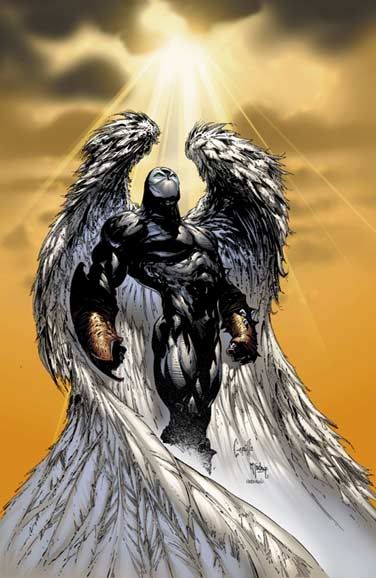Well, now that we have a good discussion in regards to the hero/anti-hero archetype, I’m curious to see if we can take this topic a bit further, and slightly darker, so to speak. Since we can agree on anti-hero types as complex characters, how would be describe a character that possessed true heroic ideals, but due to some sort of tragedy (which could be anything) slowly and inevitably become the full antagonist he/she once strived so hard to fight against. In short I present the Fallen hero.
Wednesday, December 29, 2010
Fallen Heros: The blurred grey line between them and the Anti-hero
Posted by
M.Wanderer
Well, now that we have a good discussion in regards to the hero/anti-hero archetype, I’m curious to see if we can take this topic a bit further, and slightly darker, so to speak. Since we can agree on anti-hero types as complex characters, how would be describe a character that possessed true heroic ideals, but due to some sort of tragedy (which could be anything) slowly and inevitably become the full antagonist he/she once strived so hard to fight against. In short I present the Fallen hero.
8
comments

 Labels:
Afro Samurai,
Anti-hero,
archetypal,
Fallen-hero,
Harold Lauder,
Hero,
Justice,
redemption,
The Stand
Labels:
Afro Samurai,
Anti-hero,
archetypal,
Fallen-hero,
Harold Lauder,
Hero,
Justice,
redemption,
The Stand
Wednesday, November 17, 2010
Anti-heroes, the Good? the Bad? or something in between?
Posted by
M.Wanderer



We all know in the majority
of all storytelling, there are protagonists (whom are typically the archetypal
heroes and focal characters of the story), and the antagonists (whom are
usually the ‘villains’ or main opposition to the protagonists). Both are prevalent
and are usually included in most story genres, including movies. At time
however, those typical archetypal roles, can be blurred and not as clear as to
whom the ‘hero’ or ‘villain’ is. This is epically true with more complex storylines
and the likeness of the characters within genres of storytelling, movies, being
no exception. Some do not carry the typical morals of the atypical hero. Some
are deeply flawed in personality or by interaction. Some do not always take the
moral high road, yet might pick certain heroic traits here and there (though
not all of them). As you’re probably aware by now, this it what we refer to as Anti-heroes.
10
comments

 Labels:
Animation,
Anime,
antagonist,
Anti-hero,
archetypal,
Batman,
Hero,
protagonist,
Samurai,
Superman
Labels:
Animation,
Anime,
antagonist,
Anti-hero,
archetypal,
Batman,
Hero,
protagonist,
Samurai,
Superman
Thursday, November 11, 2010
Alternate Reality, Why do we seek it? Where? and to what end?
Posted by
M.Wanderer


When one hears the term,
“alternate reality”, one might think of a different world, or a subconscious
level of living like a dream state. Others may think of a completely different
state of existence from their current one, while those that are more
technically inclined, may think of alternate or fractured timeline changes due
to a different choice or interference (directly or indirectly) in the space
time continuum (some of you trekkers out there love that last one I’m sure).
What’s interesting is that of late in Hollywood, many movies have taken on the
form of storytelling by adding on to various degrees of an alternate reality
(A.R for short) in its content.
6
comments

 Labels:
Alternate,
Avatar,
Bible,
Everquest,
ExistenZ,
Guild Wars,
Inception,
MMORPG,
Narnia,
Pan's Labyrinth,
Reality,
Revalations,
Second Life,
The Matrix,
The Sims,
Tron,
World of Warcraft
Labels:
Alternate,
Avatar,
Bible,
Everquest,
ExistenZ,
Guild Wars,
Inception,
MMORPG,
Narnia,
Pan's Labyrinth,
Reality,
Revalations,
Second Life,
The Matrix,
The Sims,
Tron,
World of Warcraft
Wednesday, October 6, 2010
The Distinguished Gentleman
Posted by
DA
.jpg)
I am an Eddie Murphy fan. Pound for
pound, he may be the best "actor" in Hollywood. In any given movie,
he can make you believe he's a cheesy lounge singer, or Jewish, or Asian, or a
geek, or a professor, or the professor's mother, or father, or grandmother, or
a robot...I'm not speaking to the scripts he accepts, but insofar as playing a
role, he's covered plenty of ground from cop to crook.
Most people who remember his 80s
material will long for those more earthy roles against the kiddie movie fluff
he's been doing of late (although, as Disney can tell you, there's money in
kiddie fluff). However, it isn't to say all his earlier films are nothing but
"filth, flarn, flarn, filth" - an all too easily forgotten gem is The
Distinguished Gentleman.
Sunday, August 15, 2010
Friday, July 9, 2010
The Avatar Review: Part 4 "Race Relations vs. Culture Chaos"
Posted by
M.Wanderer
Would one think that nowadays a Hollywood /big
budget blockbuster movies should be generalized or at least include typical or
common clichéd themes? Even when these same themes become so stereotypical,
their borderline brain-draining, to downright insulting?
The reason I open with that
question, is to see if the more successful films (in budget and not necessarily
in content) follow the typical story-plot genres, particularly in comparison to
the film Avatar, its characters, and social themes both obvious and
under-toned. Now we have briefly touched on this in my Iconic
Impact and Militaristic
Message posts, so thought I would bring this up into further detail.
Monday, July 5, 2010
You're judging this [expletive] the wrong way: Pulp Fiction & miracles
Posted by
DA
"Coincidence is when
God chooses to remain anonymous."
I used the term "judging" in the title of
this 3rd installment exploring Pulp Fiction's treatment of
redemption, but I'm not using it as it has been used in previous
posts on the theme of judgment.
For you fans of Koine Greek, there's a nuanced difference (pun intended) between krino and diakrino (and katakrino, and anakrino, etc.). In this post, we're talking about the issue of discernment - differentiating one thing from another; what we're differentiating are coincidence and providence.
For you fans of Koine Greek, there's a nuanced difference (pun intended) between krino and diakrino (and katakrino, and anakrino, etc.). In this post, we're talking about the issue of discernment - differentiating one thing from another; what we're differentiating are coincidence and providence.
Wednesday, June 30, 2010
You can't handle the truth! A Few Good Men, complexity and judgment
Posted by
DA
"You
want answers?"
"I think I'm entitled."
"You want answers?"
"I want the truth!"
"You can't handle the truth!"
"I think I'm entitled."
"You want answers?"
"I want the truth!"
"You can't handle the truth!"
That great line was voted as the #29 movie quote by the American Film
Institute (out of 100), and #92 of "The 100 Greatest Movie Lines" by Premiere
in 2007.
A Few Good
Men is loosely based on a true story. In the movie, two soldiers are
charged with killing one of their bunkmates. Demi Moore, Kevin Pollack and Tom
Cruise are to defend them, and it's supposed to be but a bit of paperwork to
put these young men away...but something doesn't add up.
Sunday, June 20, 2010
The Avatar Review: Part 3: "Spiritual-Religious Insightfuls or Mislead Mamipulation?"
Posted by
M.Wanderer


One of the more prevalent
arguments you will find in Christianized movie going, (er is there such a
thing, or am I being too generalized in labeling?) is the influence of the film
has on the audience, or specifically the Christians who see the film. The
debates can range from, why are they going to see the movie in an atmosphere of
a theatre to begin with (as discussed briefly in my “Film Limitations,” post),
to how will this film affect me spiritually, if at all?
Friday, June 11, 2010
Independence Day and the dark side
Posted by
DA
Independence Day was a
1996 summer blockbuster popcorn flick, to be sure. However, there is a very
interesting thematic development that goes largely unnoticed with all the
action and corny screenplay.
The essential theme is "overcoming the dark
side", and explorations have resulted in some significant films including Apocalypse Now, the Star Wars story (they shout
it in your face throughout the trilogy), and Falling Down. The protagonist sees in the
antagonist his own dark side. The decision to overcome the dark side usually
means some form of destruction of the antagonist by the protagonist, whether in
symbol or literal death, to confirm the rejection of temptation to give in to
the dark side.
Thursday, June 10, 2010
The Last Airbender; the Last make-or-break for Shyamalan?
Posted by
M.Wanderer

Not to worry, I am still working on the Avatar
review, but just wanted to go a little off topic to a movie coming up that I
(and quite a few others) have concerns about.
As some of you know, I'm a big fan of the
"other" Avatar animation series (aka Avatar: The Last Airbender). And
I'm certain I'm not the only fan of the series currently posting on here
too...(hint-hint). I even have all 3 seasons on DVD, So when I heard they were
going to do a live version of this series, I was surprised and quite excited.
That is until I found out that none other than M. Night Shyamalan is producing
and directing this film..(and I also know that I'm not the only poster that has
strong opinions on this filmmaker too *hint-hint*)
Tuesday, June 8, 2010
American Gangster and the devil on 116th Street
Posted by
DA
In the movie The Usual Suspects, Roger
"Verbal" Kint (Kevin Spacey) answers Dave Kujon's (Chaz Palminteri)
question: "Who is Keyser Soze? He is supposed to be Turkish. Some say his
father was German. Nobody believed he was real. Nobody ever saw him or knew
anybody that ever worked directly for him, but to hear Kobayashi tell it,
anybody could have worked for Soze. You never knew. That was his power. "The
greatest trick the Devil ever pulled was convincing the world he didn't exist."
The Usual Suspects is a great movie, but it's a
work of fiction. American Gangster,
however, is based on a true story, and not only speaks to the discussion of the
devil's approach, but also reflects wonderful aspects of the salvation
relationship.
Sunday, June 6, 2010
The Avatar Review: Part 2: "Militaristic Message?"
Posted by
M.Wanderer

First off, my apologies for
not getting this one out sooner, I got caught up in daily life events and such,
as well as waiting for some feedback from a friend, specifically for this theme
critique of the movie (you’ll see why).
With many films that have
opposing factions between the obvious protagonist and antagonist characters,
the inevitable epic battle is sure to take place. No more is this true than in
the movie Avatar and its battle between the various ground and aerial Na’vi
tribes and the military might of the RDA Sec-Ops (with a nice soundtrack to go
with this battle sequence too, I might add).

Many have described the
battle as symbolic of progress vs. nature, colonialism vs indigenous cultural
identity, or even capitalistic imperialism vs. noble savages. Typically, it
becomes apparent that the human military are the antagonists, and such is the
case in this film, but I've got to ask the question: is this depiction of the
military a fair and accurate one? Or is it too one-sided?
Tuesday, May 25, 2010
Don't put me in this position, Vincent! Pulp Fiction & Redemption Accountability
Posted by
DA
Having discussed the primary Winfield/Ringo pair in the 1st installment of Pulp Fiction's redemption treatment, we now focus on the anomaly, Vincent Vega.
Vega is the only main character to die, and Tarantino is sending a message - failing to recognize the multiple opportunities for redemption, the guiding hand that made escape possible for everyone steps aside and crazy events unfold towards his demise.
The Avatar Review: Part 1: "Iconic Impact" (Intro)
Posted by
M.Wanderer

Every generation or so there comes a movie so
unique, so groundbreaking that it becomes iconic in its own time, for that era.
Some are without question simply that, while others can be and have been
debated for its status as one of these iconic films. Some samples of those that
can be without question in regards to it uniqueness and its effect in society
for its time in my opinion include: the original Star Wars trilogy, the
Indiana Jones movies (well not so much the last one),The Godfather, The
Ten Commandments, Jaws, The Shawshank Redemption, Casablanca,
Roots, The Matrix, Dark City, E.T., The Lord of
the Rings Trilogy, and Saving Private Ryan, to name a few.
Others which I think were decent movies for their
time but not nearly as ground breaking (but which I'll mention because if I
didn't I could possibly get heat lol) might include: Terminator 2: Judgment
Day, The Green Mile, Fantasia, Titanic, The Blair
Witch Project, etc. Each of these ones did have a impact for its time. Big
enough to be considered iconic? Well, that’s debatable.
Monday, May 24, 2010
Redemption & saviour types: Hollywood’s go-to sources
Posted by
DA

Hollywood is awash in studies on redemption.
Some of the greatest movies of all time are
explorations and treatments of this redemption theme, including the following popular titles which occupy high spots on the IMDb Top 250:
- The Godfather
- the Star Wars original trilogy (we're not going to even begin to discuss episodes 1-3 here)
- Pulp Fiction and, of course (wait for it…)
- The Shawshank Redemption (and the word is baked-on into the title itself, isn't it? Nothing subtle or mysterious here at all).
Christianity is one of the primary forces that has
shaped our Western society and culture, and this world religion holds
redemption as a central theme.
As such, we continue to return to its study as it
is part of the foundation of our world view, even if we today are, as a
society, more secular and more scientifically atheistic.
Contact: Palmer Joss is one of my heroes
Posted by
DA
Contact is the story of a scientist who,
through an unexplainable experience, opens up to previously dismissed
possibilities about the nature and mysteries of our existence.
Ellie Arroway is your garden variety young scientist, pure and noble in her utter trust in science as the path to discovering truth.
Ellie Arroway is your garden variety young scientist, pure and noble in her utter trust in science as the path to discovering truth.
Along the way towards her higher awareness, she
meets an assortment of characters who sit at various stations in the spectrum
between religion and atheism, and who all are motivated by differing concerns.
Trying hard to be the shepherd: Pulp Fiction and Redemption
Posted by
DA
I find Pulp Fiction to be a remarkable treatment of the redemption theme, using several layers to accomplish the message. We’ll explore this fascinating treatment in installments.
One of the first tools Tarantino employs is a non-chronological order to the telling of the story which I believe to be a masterful stroke.
Film Limitations or Limiting Imagination?
Posted by
M.Wanderer
Sunday, May 23, 2010
Star Wars, Complexity and Judgment
Posted by
DA
For the first Generation X people who saw Star Wars in theatres as a kid in 1977 (like myself), our minds were simple - the bad guy was bad, the good guy was good, and "story" was basically about how the good guy would eventually beat the bad guy. In Star Wars, Darth Vader was the bad guy and wore black, pretty simple. At the end, his TIE fighter spiraled out of control and the theatres erupted with cheers - the bad guy was vanquished, victory won.
Enter The Empire Strikes Back and - hold the phone - the bad guy ain't so bad...is he? When he said those words "I am your father!", although we in the theatres gasped in unison with Luke "Noooo!", by the end of the movie - Luke outfitted with a new mechanical hand, Han Solo frozen in carbonite - it was clear there must needs be at least one more installment to complete the story even though we had indeed "searched our feelings, and knew it to be true."
Subscribe to:
Posts (Atom)























